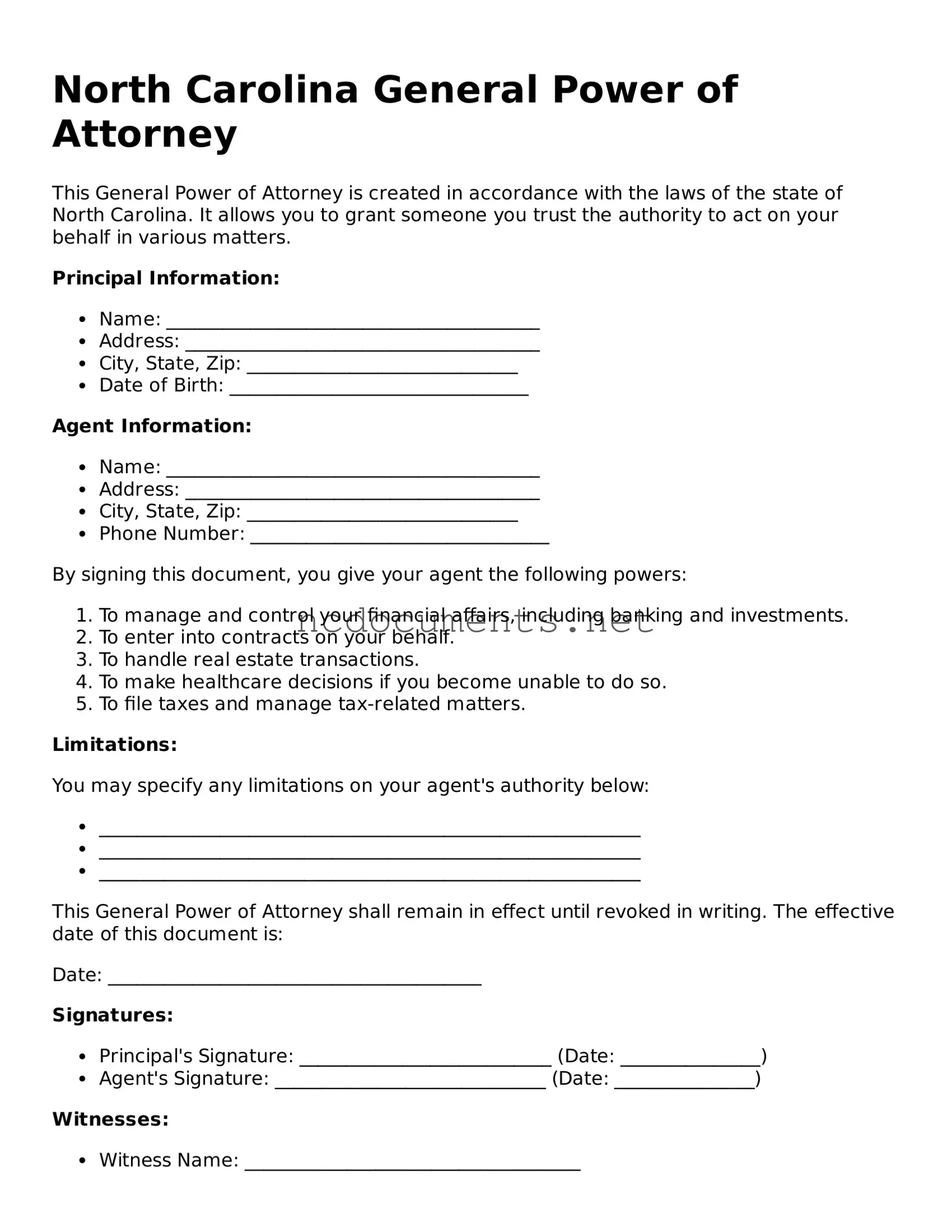The North Carolina General Power of Attorney form shares similarities with the Durable Power of Attorney. Both documents allow an individual, known as the principal, to appoint someone else, called an agent, to manage their financial and legal affairs. However, the key distinction lies in durability. A Durable Power of Attorney remains effective even if the principal becomes incapacitated, while a General Power of Attorney typically becomes invalid under such circumstances. This makes the Durable Power of Attorney particularly useful for long-term planning.
Another document comparable to the General Power of Attorney is the Limited Power of Attorney. While the General Power of Attorney grants broad authority to the agent, a Limited Power of Attorney restricts the agent's powers to specific tasks or time frames. For example, an individual might use a Limited Power of Attorney to allow someone to handle a real estate transaction on their behalf, but only for that particular purpose. This tailored approach can offer greater control over specific decisions.
The Healthcare Power of Attorney is also similar, as it enables an individual to appoint someone to make medical decisions on their behalf. While the General Power of Attorney typically focuses on financial matters, the Healthcare Power of Attorney specifically addresses health-related decisions. This document becomes crucial when the principal is unable to express their wishes regarding medical treatment, ensuring that their healthcare preferences are honored.
The Advance Directive, often paired with the Healthcare Power of Attorney, outlines a person's wishes regarding medical treatment in advance. While the General Power of Attorney allows for the appointment of an agent to make decisions, the Advance Directive provides specific instructions about the types of medical care an individual desires or does not desire. This document can be vital in situations where the principal cannot communicate their preferences.
The Revocable Living Trust shares some characteristics with the General Power of Attorney, particularly in terms of managing assets. A Revocable Living Trust allows individuals to place their assets into a trust during their lifetime, with the ability to alter or revoke it as needed. While the General Power of Attorney grants authority to an agent to manage assets, the trust structure provides a more comprehensive plan for asset distribution upon the individual’s death, potentially avoiding probate.
When it comes to creating a smooth transaction for buying or selling personal property, utilizing resources like the All Colorado Documents can be invaluable. This ensures that both parties are well-informed and that the necessary legal protections are enforced, thereby facilitating a clear understanding of the obligations and rights during the transfer.
A Will is another document that has similarities with the General Power of Attorney. Both documents are essential in estate planning, but they serve different purposes. A Will specifies how a person's assets should be distributed after their death, whereas the General Power of Attorney is effective during the principal's lifetime and focuses on decision-making authority. Together, they create a more complete estate plan.
The Financial Power of Attorney is closely related to the General Power of Attorney, as it specifically addresses financial matters. While a General Power of Attorney can encompass a wide range of responsibilities, the Financial Power of Attorney is focused solely on managing financial transactions, including banking, investments, and bill payments. This document can be particularly useful for those who want to ensure their financial affairs are managed effectively.
The Special Power of Attorney is another variant that allows for the delegation of authority for a specific purpose or transaction. Similar to the Limited Power of Attorney, this document restricts the agent's powers to particular tasks. For instance, a Special Power of Attorney may be used for a single real estate closing or to handle a specific financial obligation. This focused delegation can help simplify certain processes.
Lastly, the Springing Power of Attorney is similar in that it becomes effective only under certain conditions, typically when the principal becomes incapacitated. Unlike the General Power of Attorney, which is effective immediately upon signing, a Springing Power of Attorney requires the occurrence of a specific event to activate the agent's authority. This can provide peace of mind for individuals concerned about relinquishing control before it is necessary.

